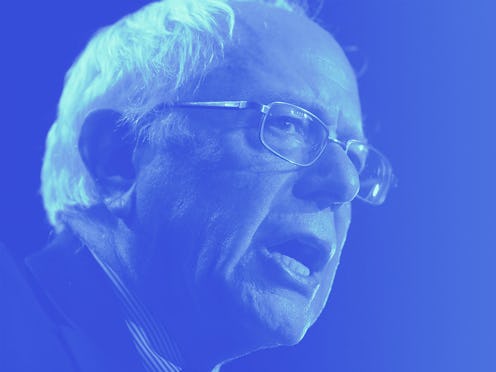News
Bernie Sanders' Legacy Will Inspire

After running one of the most unexpectedly successful grassroots presidential campaigns in history, Bernie Sanders formally endorsed Hillary Clinton on Tuesday. At a rally in Portsmouth, New Hampshire, the Vermont senator gave his stamp of approval to the presumptive Democratic nominee. Even though Sanders did not win the nomination, or even come as close as Clinton did to winning it in 2008, I believe his campaign will serve as a model for more outsider, underdog, dismissed-as-a-protest-candidate campaigns in the future.
When Sanders confirmed he was planning to run for president over a year ago in April 2015, few thought he'd be a formidable threat to Clinton. An NBC / Wall Street Journal poll from June 2015 had Clinton beating Sanders by 60 points with Democratic voters nationally. However, Sanders got plenty of Americans to starting feeling the Bern. After finishing in a "virtual tie" with Clinton in the Iowa caucus, Sanders was viewed as a legitimate threat to her campaign.
Many pundits and journalists noted that Sanders' campaign forced Clinton to shift left on a number of critical issues, including the federal minimum wage and lowering the costs of college tuition. Last week, Clinton announced a proposal to cut all college tuition costs for in-state universities for families making under $125,000 — which many saw as Sanders' influence rubbing off on her. Sanders has long advocated for raising the federal minimum wage to $15 an hour. Over her campaign, Clinton has emphasized her support for the Fight for $15 movement and raising the minimum wage to $15 in different state-by-state ways — though as Politico noted, she still officially "supports raising the federal minimum wage to $12." Former Pennsylvania Gov. Ed Rendell, a Clinton supporter, told Politico: “I think she learned there’s anger on the left ... Had she run unopposed, or with only Martin O’Malley, she never would have learned that.”
Sanders led a record-setting campaign in terms of his grassroots fundraising, raising an unprecedented $210 million through donations from some 7.4 million supporters, contributing on average a relatively modest $27. That accomplishment in and of itself will likely inspire future candidates who otherwise never would have thrown their hats into the hyper-competitive, hyper-expensive presidential ring.
Sanders had once vowed to continue his campaign all the way to the Democratic National Convention in Philadelphia in July. Politico reported in May that the Vermont senator told the National Press Club in Washington, D.C. that "it will be a contested convention." However, in recent weeks, Sanders faced increasing pressure from Democrats to bow out — even reportedly being booed by members of the House of Representatives. Though he didn't quite make it to Philadelphia, it's hard to argue that he didn't fight to the finish.
Image: Bustle/Dawn Foster